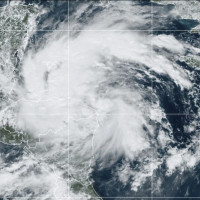- Friday, 15 November 2024
Trump's mainstream picks for foreign policy posts could reassure allies
Washington, Nov. 15: President-elect Donald Trump is famously unconventional, but he made conventional picks for his two top foreign policy positions. That could be reassuring to American allies, while China and Iran have reasons to be wary.
Trump on Wednesday announced his choice of Sen. Marco Rubio for secretary of state. Two days earlier, he picked Rep. Mike Waltz for national security adviser.
Both men share Trump's hard-line stance on China and Iran. They have shown themselves willing to adapt their foreign-policy positions to echo aspects of Trump’s more isolationist “America First” approach — a requirement for anyone serving under a president who demands absolute loyalty.
But both are fairly mainstream conservatives with foreign policy experience who have previously differed with Trump on Russia, NATO and other issues.
They've also been open to working with Democrats — a point underscored when Sen. Mark Warner, the Democratic chairman of the Senate Intelligence Committee, said Rubio would be a “strong voice for American interests” abroad.
Rubio and Waltz stand in contrast to some other national security selections. Trump named Pete Hegseth, a Fox News host untested on the global stage, as defense secretary. He picked a congresswoman with little foreign policy experience, Rep. Elise Stefanik, as ambassador to the United Nations. His choice for ambassador to Israel, former Arkansas Gov. Mike Huckabee, rejects the two-state solution to the conflict with Palestinians.
And U.S. allies may be relieved that Rubio was selected over Richard Grenell for secretary of state. Grenell is an ardent and combative Trump advocate and former diplomat and intelligence official, with a reputation for favouring autocratic strongmen abroad.
Rubio, a 14-year veteran of the Senate, is a senior member of the Senate Intelligence Committee and Foreign Relations Committee. His roots as the son of Cuban immigrants who worked as a bartender and a hotel maid after coming to the United States helped shape his tough positions on the leftist governments of Cuba and Venezuela.
While Trump has alarmed U.S. allies in Europe with his criticism of the NATO military alliance and praise of Russian President Vladimir Putin, whose war on Ukraine has galvanized European fears of Russian expansionism, Rubio was instrumental in the Senate in securing the U.S. position in NATO. He and Democratic Sen. Tim Kaine spearheaded legislation to bar any president from pulling the U.S. out of NATO without Senate approval or an act of Congress.
But Rubio, like Waltz in the House, has altered his public statements and legislative votes to more closely align with Trump's criticism of the Biden administration's backing of Ukraine as it battles invading Russian forces.
After early votes and supportive statements for Ukraine after Russia's 2022 attack, Rubio and Waltz more recently voted against additional military aid to Ukraine. Rubio, like Trump, has increasingly stressed the need to end the war.
That's in contrast to Ukraine supporters in both parties who say the U.S. must support Ukraine's fight so it gets the best possible terms in any eventual cease-fire. (AP)
















